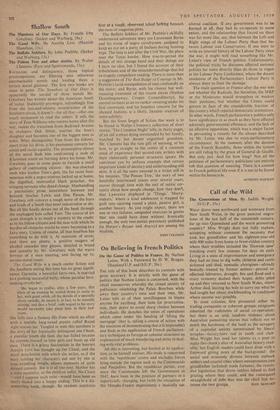Shallow South
The Numbers of Our Days. By Francis Irby Gwaltney. (Seeker and Warburg, I 8s.) The Poison Tree and other stories. By Walter Clemons. (Eyre and Spottiswoode, 15s.)
RACIALISM and delinquency, those topical preoccupations, are filtering into otherwise unremarkable novels and lending them a
certain social glamour. The first two books are cases in point. The Numbers of Our Days is
apparently the second of three novels Mr.
Gwaltney has written about the American South of today. Stalwartly pro-negro, refreshingly free from the lust-and-whimsy eccentricities of the Southern circus, it doesn't—for all that—offer one much incitement to read the others. It tells the story of Tom Williams who returns home after the war, makes the transition from Railroad Avenue to exclusive Oak Street, marries the boss's daughter and becomes one of the biggest men in town. What distinguishes Tom from his fellows, apart from his drive, is his passionate concern for social and racial equality. The presumptive climax of the novel finds him confronting a mob of Klansmen intent on burning down his home. Mr. Gwaltney goes to some pains to furnish a small gallery of contrasting citizens: the war-shocked snob who loathes Tom's guts, the fat racist busi- nessman with a negro mistress locked up at home, the dignified, mistrustful black preacher, the cringing servants who dread change. Manhandling a journalistic prose somewhere between and beneath Sinclair Lewis and Dos Passos, Mr. Gwaltney still conveys a rough sense of the fears and feuds of a South that must industrialise or die. But all life finally drains out of the book through the unplugged hole called Tom. The source of his quiet strength is as much a mystery to the reader as to his fellow-citizens and the ease with which he hurdles all obstacles would be more becoming to a fairy story. Unless; of course, all that bourbon has something to do with it. At moments of stress, and there are plenty, a positive niagara of alcohol cascades into glasses, detailed in brand and quantity by Mr. Gwaltney with the warm fervour of a man meeting, and facing up to, serious moral issues.
The Good Wife is a much cooler fiction and the Southern setting this time has no great signifi- cance. Garnette, a beautiful forty-two, is married to a pushing successful bully, whose peculiar love- making revolts her :
She began to realise, after a few years, that when of an evening he settled down to recite to her, with great relish, all the details of a specially clever swindle, he meant it, in fact, to be sexually stirring; and that a brief, rude sequel to his story would inevitably take place later in their bed- room.
She falls into a fantasy life from which an affair with a worldly long-nosed pianist called Raoul Agle rescues her. Tangled in with this novelette is the story of her frantically delinquent son Chant, a pustular youth she feels she has failed because he exposes himself to little girls and beats up old men. There is a grimy fascination in the horrors Aurelia Levi has thought up for Chant, and the aloof detachment with which she writes, as if she were holding her characters out one by one at nose-wrinkling length, allows moments of quite shrewd comedy. But it is all too neat. Mother has a slave mentality, so the children suffer. No Chant --and I suppose such exist—would have been so easily fooled into a happy ending. This is a dis- concerting book, though. Its random acerbities
hint at a tough, observant talent lurking beneath the mess of magazine plots.
The Buffalo Soldiers of Mr. Prebble's skilfully understated adventure story are Lieutenant Byrne and his troop of negro cavalrymen, assigned to
keep an eye on a party of Indians during hunting trips. The time is just after the Civil War, the place
near the Texas border. How true-to-period the details of this strange band and their doings are I have no idea, but I found the account of their tribulations and of the misunderstandings that led
to tragedy compulsive reading. There is more than a suggestion of The Red Badge of Courage in Mr.
Prebble's lucid manipulation of men confusedly on the move; and Byrne, with his clumsy but well- meaning treatment of the recent slaves (Nathan Donethegetaway, Crispin Cometoliberty), his mental torment as an ex-ranker sweating under his first command, and his hopeless concern for the cheated Indians, is a likely, likeable creation of some subtlety.
But the finest length of fiction this week is to be found in Walter Clemons's collection of short stories. The Common Night' tells, in thirty pages, of an old woman dying surrounded by her family, watched by her decent anguished grandson. Mr. Clemons has the rare gift of seeming, at his best, to go straight to the centre of a common stock of experience that second-rate writers with their elaborately personal structures ignore. He convinces you by unfussy example that certain important kinds of decency and understanding still exist. It is all the more unusual in a writer still in his twenties. 'The Poison Tree,' the story of two hatefully intertwined sisters over several years, moves through time with the sort of satiric cer- tainty about how people change, how they don't, that Lawrence displayed in 'Things.' Merry- makers,' where a kind adolescent is trapped by guilt into squiring round a plain, passive girl, is another beauty. As you 'might expect, there are one or two failures, congealed exercises in genres that one could have done without. Ironically enough, the only two stories previously published (in Harper's Bazaar and Argosy) are among the weakest. '
JOHN COLEMAN


































 Previous page
Previous page